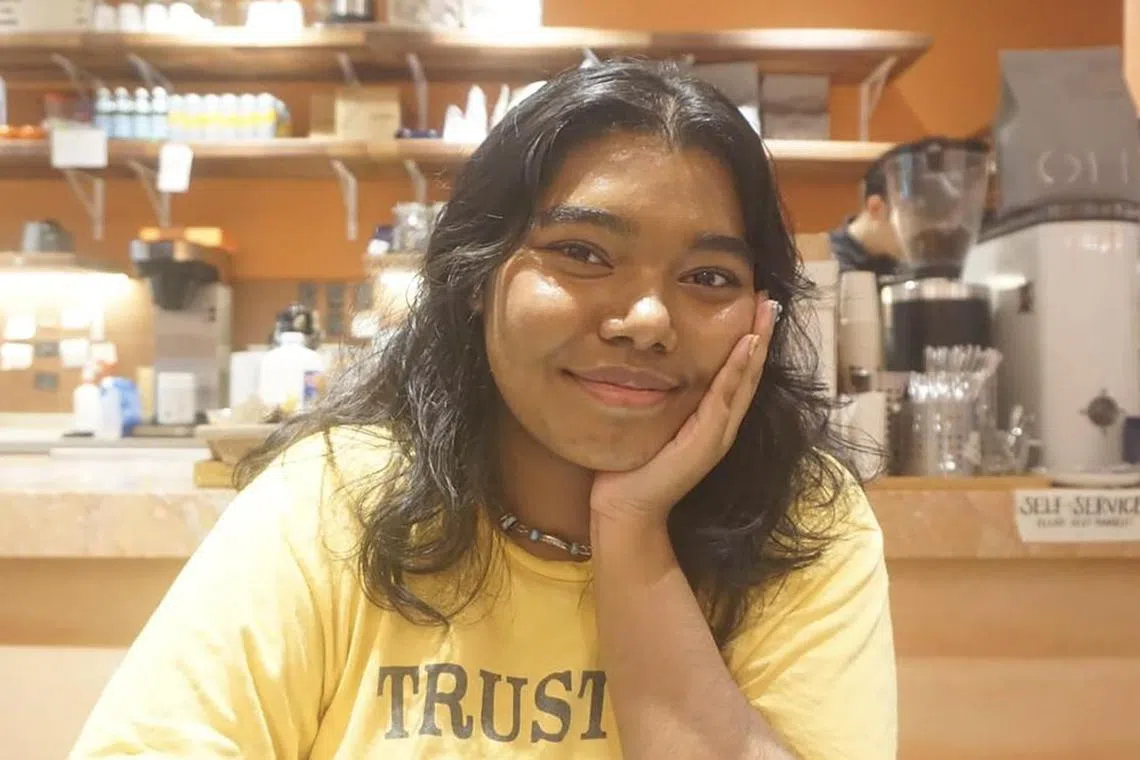What to do if you have difficult project group mates?
The TL;DR: Group projects are part and parcel of school life, but they can be a headache when group members don’t pull their weight or don’t see eye to eye. Clear communication, setting expectations and keeping records of work done are among ways to manage the situation. As a last resort, lecturers are asked to mediate.
Sign up now: Get ST's newsletters delivered to your inbox

Republic Polytechnic graduate Raiysa Rawnok, 21, found herself in a group where some members had to plead with the others to contribute.
PHOTO: COURTESY OF RAIYSA RAWNOK
SINGAPORE — Ms Raiysa Rawnok, 21, a Republic Polytechnic graduate, recalled one of the most challenging experiences she had in polytechnic: “Our groupings were randomly chosen, and I ended up in a group of four with two classmates who had a reputation for underperforming in their schoolwork.
This resulted in imbalanced workloads from the beginning of the project. “We had to constantly ask, and even pleaded, for the others to contribute. One of the worst moments was when someone who didn’t lift a finger the entire time asked to present a few slides,” she recalled.
Experiences like hers are not uncommon. Navigating group projects in polytechnic or university can be a minefield of conflicts, miscommunication and mismatched expectations, said students.
For Ms Reshma Subramaniam, 23, a Nanyang Technological University student, communication could be an issue.
She remembered working with students from various majors, many of whom were international students for whom English was not their first language, on a project for an interdisciplinary module.
“Communication became a huge barrier, especially since the project was assigned over the summer break, and most of my group mates weren’t in Singapore, which made delegating tasks more difficult,” she said.
While the students who encountered difficulties attempted to resolve them on their own, they discovered that this did not always succeed.
Ms Reshma said that she tried to communicate with her international group mates using tools such as Google Translate.
“Despite my efforts, the quality of their contributions didn’t meet my expectations, so I ended up redoing portions of the work myself. It was frustrating, but I understood they were putting in their best effort under the circumstances.”

Language barriers stood in the way for a project NTU student Reshma Subramaniam was involved in.
PHOTO: COURTESY OF RESHMA SUBRAMANIAM
Ms Raiysa said she makes it a point to schedule regular meetings with her group mates “to keep everyone accountable”, adding that “it helps me check in on progress in real time and ensures everyone is contributing”.
Flagging the situation to lecturers and getting them to intervene is also a possibility.
Said Ms Raiysa: “I’ve been in situations where the best option was to bring the issue to the lecturer. The workload gets redistributed, and the disengaged member gets graded accordingly.”
Temasek Polytechnic senior lecturer Felicia Nah said that students not contributing to a group project can be marked down. She did, however, emphasise that while lecturers are available to step in when issues arise, their role is to facilitate rather than provide solutions.

Temasek Polytechnic senior lecturer Felicia Nah said that students not contributing to a group project can be marked down.
PHOTO: COURTESY OF FELICIA NAH
“My fondest wish is for students to sort out group dynamics themselves. I think the issues are better dealt with by the group members because they know each other best,” she said.
How to manage conflicts with project group mates:
- Instead of picking group mates based solely on friendships, try to pick group mates who have similar goals to prevent conflicts in the first place.
- Communicate and be clear about your concerns.
- Keep track of who did what, and how the work is distributed.
- Keep discussions task-focused so that criticisms are about the work and not about the person.
- As a last resort, ask your lecturer to mediate but be mindful that this could potentially sour ties within the group.
This story is adapted from a Temasek Polytechnic final-year project by students Gabriel Ramsey Ranasinghe, Goh Kun Leong Kevin, Ryan Yeo Kee Hng, Charlene Wang En Hui, Ler En Jia Genevieve and Ezryna Alysha Muhammad Ridewan.


